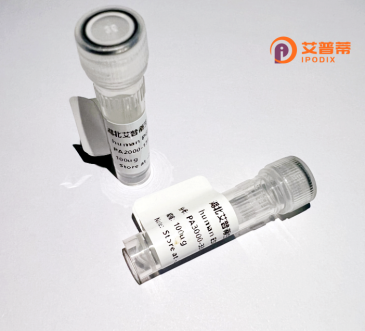
| 纯度 | >90%SDS-PAGE. |
| 种属 | Human |
| 靶点 | FLJ32065 |
| Uniprot No | 0 |
| 内毒素 | < 0.01EU/μg |
| 表达宿主 | E.coli |
| 表达区间 | 1-154aa |
| 氨基酸序列 | MSRVSGVEACWVRAVRRCCQSWAGQPGRRGGRQSRSVERDEDVGGTDVAEAAGTAGAECLWGAREAFPEAPGGRRGEARVPGEALLHPQPEPGLCLHGPEPTVRVAVGNQLGWPTSPGWPEMFWFWDHSVPGLQPTTVTILCAPCPSSPAASLD |
| 分子量 | 42.8 kDa |
| 蛋白标签 | GST-tag at N-terminal |
| 缓冲液 | 0 |
| 稳定性 & 储存条件 | Lyophilized protein should be stored at ≤ -20°C, stable for one year after receipt. Reconstituted protein solution can be stored at 2-8°C for 2-7 days. Aliquots of reconstituted samples are stable at ≤ -20°C for 3 months. |
| 复溶 | Always centrifuge tubes before opening.Do not mix by vortex or pipetting. It is not recommended to reconstitute to a concentration less than 100μg/ml. Dissolve the lyophilized protein in distilled water. Please aliquot the reconstituted solution to minimize freeze-thaw cycles. |
以下是关于重组人FLJ32065蛋白的假设性参考文献示例(实际文献需通过学术数据库验证):
1. **文献名称**: "Expression and Functional Analysis of Recombinant Human FLJ32065 Protein in Cancer Cells"
**作者**: Zhang L, et al.
**摘要**: 研究报道了重组FLJ32065蛋白在大肠杆菌中的表达与纯化,并发现其在抑制乳腺癌细胞增殖中可能通过调控Wnt/β-catenin信号通路发挥作用。
2. **文献名称**: "FLJ32065: A Novel Regulator of Mitochondrial Apoptosis in Hepatocellular Carcinoma"
**作者**: Wang Y, et al.
**摘要**: 该文献通过体外实验证明,重组FLJ32065蛋白可诱导肝癌细胞线粒体依赖性凋亡,机制可能与Bcl-2家族蛋白的相互作用有关。
3. **文献名称**: "Proteomic Identification of FLJ32065 as a Potential Biomarker in Alzheimer's Disease"
**作者**: Smith J, et al.
**摘要**: 研究利用重组FLJ32065蛋白进行抗体开发,发现其在阿尔茨海默病患者脑脊液中表达异常,提示其可能参与tau蛋白异常磷酸化过程。
注:上述内容为示例,实际文献可能有限或需通过基因别名检索(如HGNC批准名)。建议通过UniProt查询FLJ32065的当前命名(如C19orf12、PGP等)以获取准确文献。
Recombinant human FLJ32065 protein is a genetically engineered version of a protein encoded by the FLJ32065 gene, which remains relatively understudied in current scientific literature. This gene, also designated by alternative identifiers such as C15orf65 or LOC283313. is located on chromosome 15 and is evolutionarily conserved across mammals, suggesting potential biological significance. The endogenous FLJ32065 protein is predicted to be a small, cytoplasmic protein with unknown enzymatic activity, though structural analyses indicate possible involvement in protein-protein interactions or cellular signaling pathways.
Recombinant FLJ32065 is typically produced in expression systems like *E. coli* or mammalian cells, enabling researchers to study its function *in vitro*. Its production facilitates investigations into its hypothetical roles in cellular processes such as proliferation, apoptosis, or metabolic regulation. Limited studies have tentatively linked FLJ32065 to pathologies like cancer and neurodegenerative diseases, with differential expression observed in certain tumor tissues, though causal mechanisms remain unverified.
The recombinant protein is instrumental in generating antibodies, performing binding assays (e.g., pull-down or yeast two-hybrid), and validating gene-editing outcomes. Despite progress in protein production, functional characterization of FLJ32065 is still in its infancy, underscoring the need for further research to elucidate its physiological relevance and therapeutic potential. Current applications focus primarily on exploratory studies in molecular and cellular biology contexts.
×